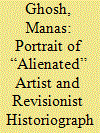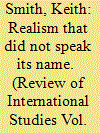| Srl | Item |
| 1 |
ID:
167172


|
|
|
|
|
| Summary/Abstract |
East-Asian auteur cinema since 1980s, acclaimed in the global art cinema circuit, has critically examined the idea of the nation-state and cultural identity. In order to put forward the critical discourses of postcoloniality, the East-Asian cinema from the PRC, Taiwan, and South Korea has framed a dialectical relationship between history (of the official version) and memory (of personal experiences). It is interesting to note that the auteur cinema of PRC, Taiwan, and South Korea, which has investigated the relationship between history and memory, often placed the biographical and mythical stories of artists’ lived experiences, which have been marginalized in the official accounts of history, at the center of their narratives. This article aims to discuss how the postcolonial and post-Cold War re-imagination and re-figuration of the national culture in the auteur cinema of the PRC, Taiwan, and South Korea found embodiment in the portrait of artists.
|
|
|
|
|
|
|
|
|
|
|
|
|
|
|
|
| 2 |
ID:
153258


|
|
|
|
|
| Summary/Abstract |
E. H. Carr was one of Europe’s pre-eminent thinkers in the field of international affairs. Yet his contribution to International Relations theory is continually questioned. Realists depict Carr as a quintessential realist; revisionists draw from his wider corpus to qualify his contribution. Although not inaccurate, the revisionist literature is incomplete as it neglects a number of Carr’s diplomatic histories. Refocusing on these, especially the manner in which traces of Ranke’s ‘the primacy of foreign affairs’ tradition is evident, this article points to a more conservative and less critical Carr. Utilising an interpretivist framework, this shift in traditions of thought is explained by the dilemmas Carr faced. Although works of history rather than theory, the article contends that Carr’s diplomatic histories remain relevant, particularly with regard to the embedded criticism of realpolitik they contain. This realisation is made evident through a reading of Carr in parallel with the concept of tragedy.
|
|
|
|
|
|
|
|
|
|
|
|
|
|
|
|